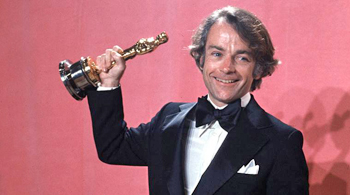Los Angeles, Jun 17: John G Avildsen, who directed Rocky and The Karate Kid — two dark-horse, underdog favorites that went on to become Hollywood franchises — died Friday at age 81.
Anthony Avildsen said his father died Friday in Los Angeles from pancreatic cancer. "He was a pretty extraordinary man in my estimation. He was super talented and very driven and very stubborn and that was to his detriment but also often to his benefit," Anthony Avildsen said.
Rocky was a huge success. It won Oscars for best picture, director (Avildsen) and editing and was nominated for seven others. No less a Hollywood eminence than Frank Capra loved it, telling The New York Times in 1977, "When I saw it, I said, 'Boy, that's a picture I wish I had made.' " For his part, Avildsen said Capra — who also championed underdogs on film — was his favorite director.
Rocky was a chance venture for Avildsen. Sylvester Stallone, then unknown, had written the script and sought Avildsen to direct it, but Avildsen was already working on another film. Suddenly the production company ran out of money and that film was canceled.
A friend sent Avildsen the Rocky script. "On page 3, this guy (Rocky) is talking to his turtles, and I was hooked," Avildsen remarked. "It was a great character study." Avildsen agreed to direct Rocky even though he knew nothing about boxing.
The film was shot on a tight budget, less than $1 million, and it was completed in 28 days.
"The first time I showed it to 40 or 50 friends, they all freaked out, so that was encouraging," he recalled. "But I guess when I saw the lines around the block, it began to take on a reality."
Five sequels followed, but Avildsen turned them down, until the fourth, Rocky V, in 1990. He said he considered it a good script and liked that Rocky would die. During the shooting, the producers decided Rocky had to live. "You don't kill off your corporate assets," Avildsen commented. The fifth sequel, Rocky Balboa, came out in 2006.
The Karate Kid was another surprise hit. In it, a teenager, hounded by bullies played, by Ralph Macchio seeks help from a Japanese handyman (Noryuki "Pat" Morita) who teaches him about karate. At the climax, a newly self-confident Macchio takes on a bully in a karate contest — and wins.
Released in the summer of 1984, The Karate Kid attracted millions of youngsters and brought Morita, a veteran performer best known for his TV roles, an Oscar nomination as best supporting actor.
"As soon as the producers saw the business it was doing, they wanted to do it again," Avildsen said in a 1986 interview. "I was very apprehensive. I didn't want to do a sequel because this was a very tough act to follow."
He relented and directed both The Karate Kid, Part II in 1986 and The Karate Kid, Part III in 1989. (The franchise was revived in 2010 with a hit remake directed by Harald Zwart.)
Avildsen had come up the hard way in films. He started with a long apprenticeship as assistant director, then moved up to production manager, cinematographer and editor.
He directed a few small films and then broke through with Joe (1970). Peter Boyle portrayed a hardhat bigot at odds with the emerging hippie youth culture.
"My hope as a filmmaker is to make people feel a little differently about something when they leave the theater," Avildsen told the Los Angeles Times in 1971.
Avildsen liked working with unknowns like Boyle. "The problem with name actors is everyone knows them, no matter how (Dustin) Hoffman-y they look," he told the Times.
Boyle, whose career got a huge boost from Joe, told The New York Times that as a director, Avildsen was "on your side. He makes you feel good about what you're doing."
After Joe, Avildsen directed Save the Tiger (1973) starring Jack Lemmon as a burned-out dress manufacturer. Lemmon won the Oscar as best actor for Save the Tiger, while Jack Gilford got a supporting-actor nomination.
Among other Oscar nominations for Rocky were two for Stallone, best actor and best screenplay; plus best actress, Talia Shire; best supporting actor, Burgess Meredith and Burt Young; and best song, 'Gonna Fly Now.'
Avildsen directed other major stars: Burt Reynolds in WW and the Dixie Dancekings (1975); George C Scott and Marlon Brando in The Formula (1980); Dan Aykroyd and John Belushi in Neighbors (1981); and Morgan Freeman in Lean on Me (1989).
He had been hired to direct Saturday Night Fever after his success with Rocky, but was let go amid differences over his desire to make the story more upbeat than the producers had in mind. "It's better not to be doing something you don't want to do," Avildsen told the Los Angeles Times after he departed from the project.
"Throughout the decades, his rousing portrayals of victory, courage and emotion captured the hearts of generations of Americans," the Directors Guild of America wrote in a statement Friday.
John Guilbert Avildsen was born in 1935 in Oak Park, IllInois, the son of a tool manufacturer. He attended New York University, then worked as an advertising copywriter. He spent two years in the Army as a chaplain's assistant.
A documentary on Avildsen, John G Avildsen: King of the Underdogs, premiered earlier this year at the Santa Barbara International Film Festival. The film, which is to be released digitally in August, was shot by Anthony Avildsen.
In a 1992 interview, Avildsen outlined his view of filmmaking, "I don't see my films as following any strict formula — even if many of them do have a similar theme. I guess I just like to see underdogs winning against the odds. To me, that is good drama. And the opposite would be too depressing."
Avildsen is survived by his sons Jonathan, Ashley and Anthony, and daughter Bridget.





Comments
Add new comment